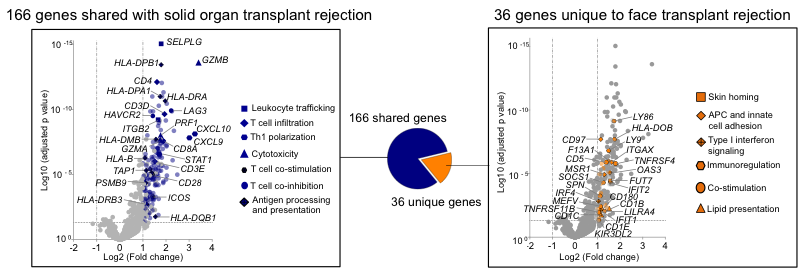Comparison with Solid Organ Transplants Reveals Distinct Face Transplant Rejection Gene Signature That Reflects the Unique Immunobiology of Skin
Brigham and Women's Hospital, Boston, MA
Meeting: 2019 American Transplant Congress
Abstract number: A67
Session Information
Session Name: Poster Session A: Basic & Clinical Science – VCA
Session Type: Poster Session
Date: Saturday, June 1, 2019
Session Time: 5:30pm-7:30pm
 Presentation Time: 5:30pm-7:30pm
Presentation Time: 5:30pm-7:30pm
Location: Hall C & D
*Purpose: Skin containing transplants, such as face transplants, are immunologically unique. We compared the gene expression profiles of acute cellular rejection in human face transplants with solid organ transplants to determine the unique molecular pathways.
*Methods: We studied skin biopsies (n=35) from seven face transplant patients collected during rejection and non-rejection, using NanoString gene expression profiling, histology and immunostaining. A combination of exploratory and supervised bioinformatic methods was used to analyze the gene expression profiles.
*Results: Grade 1 rejection (n=6), defined by the Banff criteria, did not differ significantly from non-rejection (n=10). Grade 2 rejection (n=8) had evidence of inteferon-gamma signaling and upregulation of T cell co-stimulatory as well as co-inhibitory molecules. Inteferon-gamma driven cytotoxicity, tissue injury and robust upregulation of immunoregulatory pathways were present in Grade 3 rejection (n=11). Genes of interest were validated at the protein level using immunofluorescence staining of biopsies.
To compare the gene expression signatures of face and solid organ transplants, we undertook a systematic review of the studies across human kidney, liver and heart transplants. The majority (82%) of genes upregulated in face transplant rejection were shared with those increased in solid organ tarnsplant biopsies. Face transplant rejection was uniquely associated with upregulation of immunoregulatory genes, including SOCS1, and induction of lipid antigen-presenting CD1 proteins (Figure 1).
*Conclusions: As an epithelial barrier tissue, the skin is constantly confronted by immunologic challenges and therefore, has developed complex immunoregulatory networks to dampen inappropriate inflammation and maintain homeostasis. Our data suggests that these networks are activated in face transplant rejection and could be leveraged as therapeutic strategy to reduce rejection.
Figure 1. Comparison between human face and solid organ transplant rejection
To cite this abstract in AMA style:
Win T, Dyring-Andersen B, Lopdrup R, Teague J, Murakami N, Chandraker A, Tullius SG, Pomahac B, Riella LV, Clark RA. Comparison with Solid Organ Transplants Reveals Distinct Face Transplant Rejection Gene Signature That Reflects the Unique Immunobiology of Skin [abstract]. Am J Transplant. 2019; 19 (suppl 3). https://atcmeetingabstracts.com/abstract/comparison-with-solid-organ-transplants-reveals-distinct-face-transplant-rejection-gene-signature-that-reflects-the-unique-immunobiology-of-skin/. Accessed March 1, 2026.« Back to 2019 American Transplant Congress

